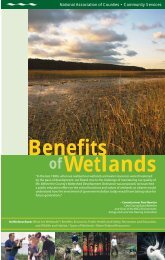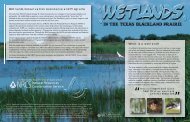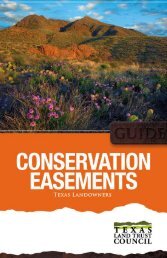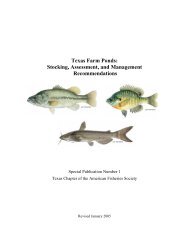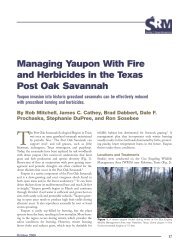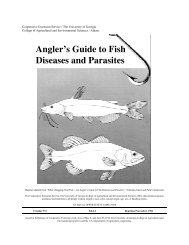Managing for Wood Ducks in East Texas - Trinity Waters
Managing for Wood Ducks in East Texas - Trinity Waters
Managing for Wood Ducks in East Texas - Trinity Waters
You also want an ePaper? Increase the reach of your titles
YUMPU automatically turns print PDFs into web optimized ePapers that Google loves.
Various methods are used to restrict predator access to nest boxes. The coneshaped,<br />
metal, predator guards are reasonably effective <strong>in</strong> reduc<strong>in</strong>g access to nest<br />
boxes by rat snakes and raccoons. However, they are not as effective as other<br />
options. Additionally, they provide no barrier to fire ants. An effective substitute<br />
that also excludes fire ants is food-grade waterproof grease. By apply<strong>in</strong>g an<br />
ample two-foot-wide band of grease to the support pole below the nest box, a<br />
barrier can be created that will exclude rat snakes, raccoons and fire ants.<br />
Dur<strong>in</strong>g hot <strong>Texas</strong> summers, grease may be absorbed <strong>in</strong>to wooden posts unless<br />
the wooden surface first is varnished or pa<strong>in</strong>ted to seal the pores. Grease may<br />
need to be re-applied periodically on support poles.<br />
A longer last<strong>in</strong>g, extremely sticky, commercial product trademarked as<br />
“Tanglefoot” <strong>in</strong>sect pest barrier can be used as a more durable alternative to<br />
grease. This is a heavy, adhesive, persistent, waterproof, nontoxic <strong>for</strong>mulation<br />
that can be smeared on the support poles under the nest boxes. TPWD trial<br />
applications of Tanglefoot have lasted six years <strong>in</strong> the field without need <strong>for</strong><br />
add<strong>in</strong>g more material. This is a very effective barrier to predators. It is<br />
<strong>in</strong>expensive, easily applied and preferred by many persons who ma<strong>in</strong>ta<strong>in</strong> nest<br />
boxes. Many local feed-and-seed stores also can obta<strong>in</strong> Tanglefoot. This is the<br />
best method <strong>for</strong> restrict<strong>in</strong>g predator access to nest boxes.<br />
Additionally, some wood duck managers report excellent success <strong>in</strong> exclud<strong>in</strong>g<br />
predators by the use of "schedule 40" polyv<strong>in</strong>yl chloride (PVC) pipe (the "blue<br />
pipe") <strong>in</strong> four-<strong>in</strong>ch diameter as support poles. The surface of the pipe is<br />
exceptionally hard and slick. Almost all predators are unable to climb this type<br />
of support pole. Obviously, application of Tanglefoot will give added protection.<br />
This type of plastic pipe, however, costs more than metal or wooden posts.<br />
Nest boxes should be <strong>in</strong>stalled whenever time is available to undertake the task.<br />
However, some people prefer to wait until late fall or early w<strong>in</strong>ter so that boxes<br />
are ready <strong>for</strong> early nest<strong>in</strong>g that can beg<strong>in</strong> <strong>in</strong> late January. If boxes are <strong>in</strong>stalled<br />
earlier than fall, they should be checked aga<strong>in</strong> <strong>in</strong> w<strong>in</strong>ter <strong>in</strong> preparation <strong>for</strong> the<br />
onset of nest<strong>in</strong>g.<br />
The potential exists<br />
<strong>for</strong> several females to<br />
nest <strong>in</strong> any given box<br />
dur<strong>in</strong>g the course of<br />
the breed<strong>in</strong>g season.<br />
The older females may<br />
nest earlier followed<br />
later by younger hens.<br />
These hens that nest<br />
later are more likely<br />
to select a box with<br />
fresh conditions rather<br />
than a box conta<strong>in</strong><strong>in</strong>g<br />
debris from the<br />
previous nest<strong>in</strong>g.<br />
16<br />
MANAGING FOR WOOD DUCKS IN EAST TEXAS




